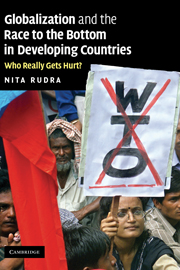Book contents
- Frontmatter
- Contents
- List of figures
- List of tables
- Preface
- 1 Introduction
- 2 The race to the bottom in developing countries
- 3 Who really gets hurt?
- 4 LDC welfare states: convergence? What are the implications?
- 5 Globalization and the protective welfare state: case study of India
- 6 Globalization and the productive welfare state: case study of South Korea
- 7 Globalization and the dual welfare state: case study of Brazil
- 8 Conclusions
- Appendix A LDC social spending
- Appendix B Assessing potential labor power
- Appendix C Additional tests for the RTB hypothesis
- Appendix D Variables in the inequality model
- Appendix E Technical notes on Gini coefficients
- Appendix F LDC Gini coefficient statistics
- Appendix G Robustness check
- Appendix H Conditional impact of trade on inequality
- Appendix I Descriptions and sources of variables
- Appendix J Cluster results minus outcome variables
- Appendix K Dendrogram for cluster analysis
- Appendix L Poverty tables
- Appendix M Social expenditures on social security, health, and education in India (percent of GDP) based on national data
- References
- Index
1 - Introduction
Published online by Cambridge University Press: 22 September 2009
- Frontmatter
- Contents
- List of figures
- List of tables
- Preface
- 1 Introduction
- 2 The race to the bottom in developing countries
- 3 Who really gets hurt?
- 4 LDC welfare states: convergence? What are the implications?
- 5 Globalization and the protective welfare state: case study of India
- 6 Globalization and the productive welfare state: case study of South Korea
- 7 Globalization and the dual welfare state: case study of Brazil
- 8 Conclusions
- Appendix A LDC social spending
- Appendix B Assessing potential labor power
- Appendix C Additional tests for the RTB hypothesis
- Appendix D Variables in the inequality model
- Appendix E Technical notes on Gini coefficients
- Appendix F LDC Gini coefficient statistics
- Appendix G Robustness check
- Appendix H Conditional impact of trade on inequality
- Appendix I Descriptions and sources of variables
- Appendix J Cluster results minus outcome variables
- Appendix K Dendrogram for cluster analysis
- Appendix L Poverty tables
- Appendix M Social expenditures on social security, health, and education in India (percent of GDP) based on national data
- References
- Index
Summary
The [Anganwadi] workers are paid only Rs. 1,000 [$21] a month and their helpers Rs. 500 [$11]. There is no dearness allowance, no paid leave, and they also do not have social security.
Such is the plight of India's Anganwadi workers, a low-caste disadvantaged group of workers that assists poor mothers and children with health and nutrition needs. After working more than eight hours a day, total earned wages keep them well below the international poverty line of $1 per day. Their persistent demands for higher wages, job security, and social security have yet to be met by the Indian government. The key to obtaining these protections, the workers argue, is to be recognized as government employees instead of part-time workers.
India's Anganwadi are not alone. In the current era of globalization disadvantaged groups of workers receive minimal or no protection against market risk. Examples from around the world attest to the near-universal tenuous position of marginal workers. The Korea Herald reports that approximately 70 percent of non-standard South Korean workers receive no social insurance, as compared to 1.7 percent for standard workers. Brazilian legislation that provides social insurance and job dismissal protection exempts at least 40 million informal workers, including domestic workers, shoemakers, garment workers, and slum dwellers. These workers have begun clamoring for the same rights to unemployment insurance, maternity leave, paid holidays, and other benefits long afforded other working Brazilians. Half a world away, thousands of Bangladeshi textile workers have taken to the streets with similar demands.
Information
- Type
- Chapter
- Information
- Globalization and the Race to the Bottom in Developing CountriesWho Really Gets Hurt?, pp. 1 - 18Publisher: Cambridge University PressPrint publication year: 2008
